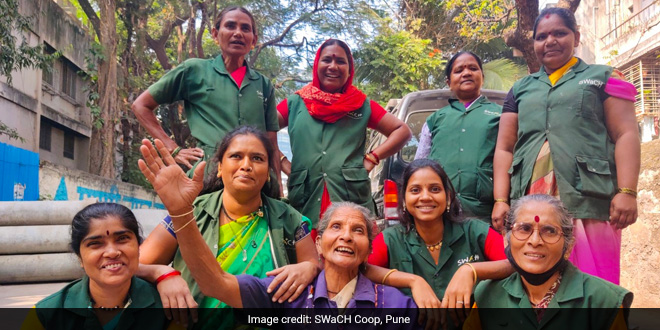 The Solid Waste Collection and Handling cooperative or (SWaCH) is the world’s largest waste picker-led cooperative, with over 3,900 self-employed members. It was formally instituted in 2005 in Pune, Maharashtra, as a wholly-owned workers’ cooperative by the Kagad Kach Patra Kashtakari Panchayat (KKPKP) trade union. Today, SWaCH is run predominantly by women from marginalized communities—serving more than 900,000 households through door-to-door collection and serves as a lighthouse for waste management practices in India and globally. This model is loved by the citizens of Pune with a thumping “Yes In My BackYard, YIMBY” chorus.
The Solid Waste Collection and Handling cooperative or (SWaCH) is the world’s largest waste picker-led cooperative, with over 3,900 self-employed members. It was formally instituted in 2005 in Pune, Maharashtra, as a wholly-owned workers’ cooperative by the Kagad Kach Patra Kashtakari Panchayat (KKPKP) trade union. Today, SWaCH is run predominantly by women from marginalized communities—serving more than 900,000 households through door-to-door collection and serves as a lighthouse for waste management practices in India and globally. This model is loved by the citizens of Pune with a thumping “Yes In My BackYard, YIMBY” chorus.
Steeped in Social justice –
In the early 1990s, waste pickers in Pune, mostly women from Scheduled Castes, faced exploitation, harassment, and invisibility in the urban waste economy. Collecting recyclable materials from dumpsites, they earned meager incomes while enduring social stigma and hazardous conditions. KKPKP, formed by activists like Dr. Poornima Chikarmane and Laxmi Narayan, organized these workers to demand recognition as environmental contributors rather than scavengers. By 1993, KKPKP had mobilized thousands, securing identity cards, medical insurance, and educational support for members’ children, challenging caste-based exclusion. KKPKP’s rallying cry, “Kachra amchya malkicha” (we own the waste), asserts waste pickers’ customary rights to recyclables, akin to forest or fish workers’ claims to natural resources. Privatization trends that favored capital-intensive, incineration-based solutions post-India’s liberalization were resisted and the user-fee-based, worker-led SWaCH model resisted neoliberal co-optation, prioritizing environmental sustainability and worker inclusion over profit-driven systems. The cooperative’s partnership with the Pune Municipal Corporation (PMC), formalized in 2008, exemplifies a pro-poor partnership, diverting 90 tonnes of recyclables daily and saving the municipality US$316,455 annually in transport costs.
The core of “Yes In My Backyard Model”
Decentralization is at the core of the SWaCH’s YIMBY model! “Decentralisation does not take us to the stone-age!” assures Lubna Ananthakrishnan, the CEO of SWaCH. Their model adopts people centered technology for efficient composing, biogas generation and recycling of dry waste. SWaCH also provides waste management as a service by operating and maintaining composing plants and biogas plants inside the premises of various bulk waste generators such as apartments, marriage halls and hotels. “It costs significantly less for bulk waste generators to operate and maintain our decentralised waste management systems than paying the bulk waste user fees to the Pune Municipal Corporation”, says Shubangi Yogeshwar, the outreach and communication executive of SWaCH cooperative. “There is also support from the Pune Corporation in the form of tax rebates to set up decentralised waste management facilities in-situ.” said Harshad, Director, SWaCH. This model generates about 3.5 jobs per ton of waste compared to just 0.1 job per ton of waste for “waste-to-energy” incineration (WTE).
SWaCH and KKPKP embody a social justice triumph by transforming waste pickers from marginalized laborers into empowered service providers, challenging caste, gender, and economic inequities. Their model serves as a lesson for Chennai by demonstrating how organized resistance can reshape urban systems, prioritizing worker dignity and environmental sustainability. Chennai which is seeing a round of protests from waste workers must lap up such models which will not only provide quality jobs but also usher an entire eco-system of start-ups in the waste management sector.
Centre for Financial Accountability is now on Telegram and WhatsApp. Click here to join our Telegram channel and click here to join our WhatsApp channeland stay tuned to the latest updates and insights on the economy and finance.

